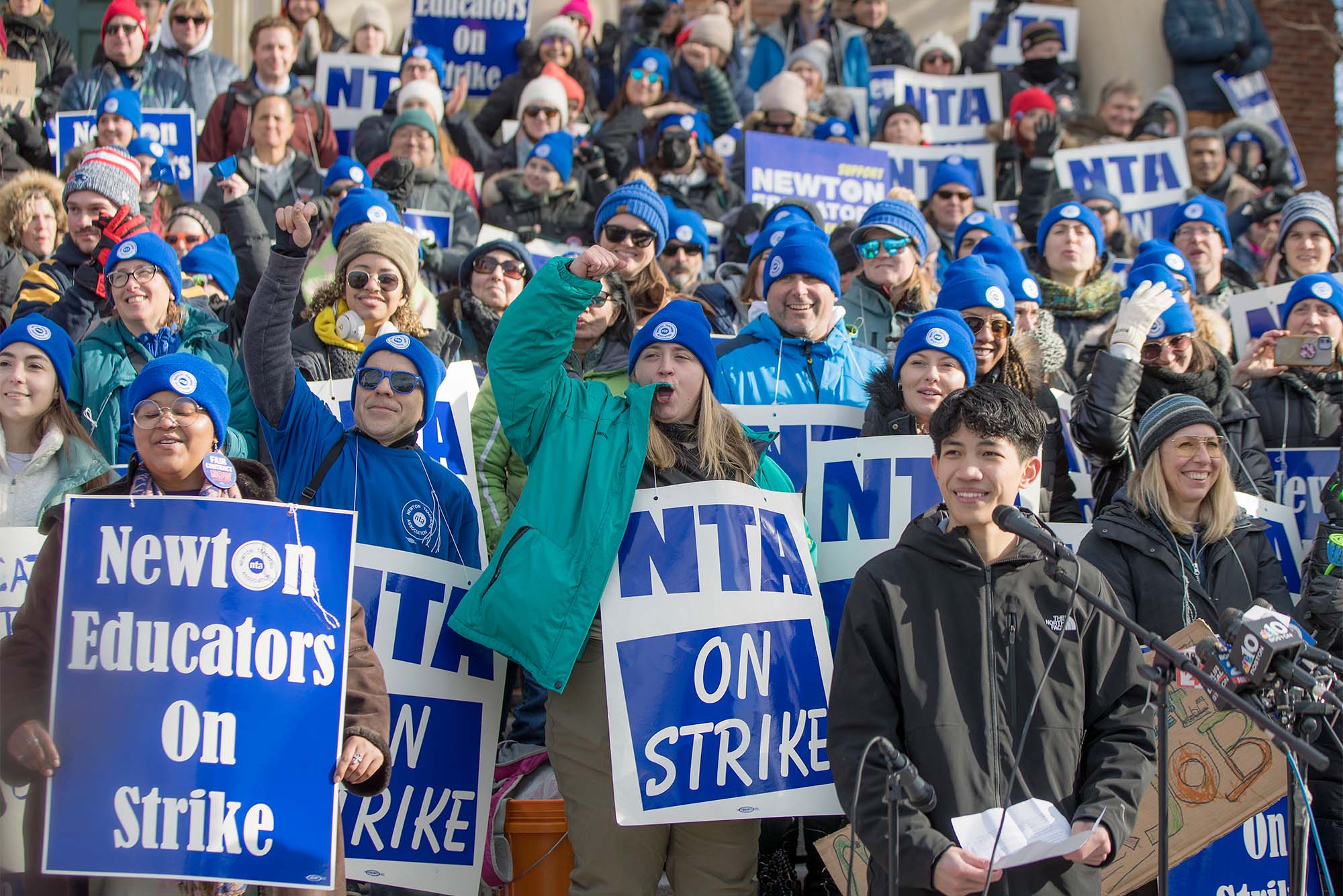Should Teachers Strike?

Striking Newton teachers heard from Evan Ng, a senior at Newton South High School, as they walked off the job January 22. Photo by Matthew J. Lee/The Boston Globe via Getty Images
Should Teachers Strike?
While the Newton, Mass., educators have some valid arguments, there are better alternatives to the illegal walkout, BU’s Joshua Goodman says
Striking teachers in Newton, Mass., are in the second week of their walkout, now the longest such action by the commonwealth’s teachers since the 1990s. Even though state law bans teachers from going on strike on the grounds that they provide an essential service and have a near-monopoly on it, history shows that hasn’t been a deterrent. Newton marks the latest of seven recent work stoppages by educators unions in the commonwealth.
As of January 29, the strike’s seventh day of canceled school, a court had fined the union $425,000, with that penalty to swell by $50,000 per day.
The standoff is not only impacting Newton’s 12,000 students, but is also of more than passing interest to nearby Boston University, where more than 600 employees call Newton home. While the two sides have agreed on parental leave rights, the strikers say remaining demands include “mental health supports for our kids, and a living wage for our behavioral therapists and aides.” They are also seeking bigger cost-of-living raises for themselves—while their salaries are in the state’s top quartile for teachers, they say they’re not keeping up with inflation or with other affluent Boston suburbs’ school pay.
The Newton School Committee says the union’s demands collectively are unaffordable and implementing all of them would require layoffs this year and in future years to meet the costs. The union has called on Mayor Ruthanne Fuller, who could funnel more municipal aid to the schools, to join the negotiations.
With the economics of education central to the Newton battle, BU Today asked Joshua Goodman to parse the issues. The Wheelock College of Education & Human Development associate professor of education is a former public high school math teacher in Watertown, Mass. He was a senior economist on the White House Council of Economic Advisers in 2022-2023, working on policy for kindergarten through 12th grade and postsecondary education. He’s also a College of Arts & Sciences associate professor of economics.
Q&A
With Joshua Goodman
BU Today: What are the potential educational impacts on student learning from the type of prolonged strike that Newton and other local school districts have seen lately?
Goodman: Newton students have now lost about 4 percent of their school year, and thus likely 4 percent of the knowledge they would have gained this year. That learning loss will persist until Newton adds back that instructional time, either at the end of the year or in summer school or in after-school hours, all of which seems unlikely to happen.
BU Today: Strike opponents say Massachusetts teachers are well paid—reflected partly in high retention rates—and have alternatives to walkouts, such as declining outside-of-school activities, including extracurriculars, student, parent, and school staff meetings, and college recommendations. Does this argument resonate with you?
Goodman: I’m sad to see the walkout, given what we’ve learned these past few years about the importance of keeping kids in school. I do think there are other strategies teachers could use that would be less harmful to students and families.
BU Today: Same question from the other angle—do the strikers’ demands for better cost-of-living raises, “mental health supports for our kids, and a living wage for our behavioral therapists and aides” justify the walkout?
Goodman: All of those are reasonable demands, but ones that could be negotiated through political processes such as local elections. If Newton families aren’t currently voting for local politicians that agree with these demands, then the teachers union’s task is to convince voters of the value of such spending.
BU Today: A proposal that would legalize teacher strikes is before the state legislature. Do you think that’s a bill that should pass?
Goodman: For the same reason we don’t allow police and firefighters to strike, I don’t think teacher strikes should be legal. These are vital services and families have no alternatives when such critical supports fall apart.
For the same reason we don’t allow police and firefighters to strike, I don’t think teacher strikes should be legal.
Comments & Discussion
Boston University moderates comments to facilitate an informed, substantive, civil conversation. Abusive, profane, self-promotional, misleading, incoherent or off-topic comments will be rejected. Moderators are staffed during regular business hours (EST) and can only accept comments written in English. Statistics or facts must include a citation or a link to the citation.